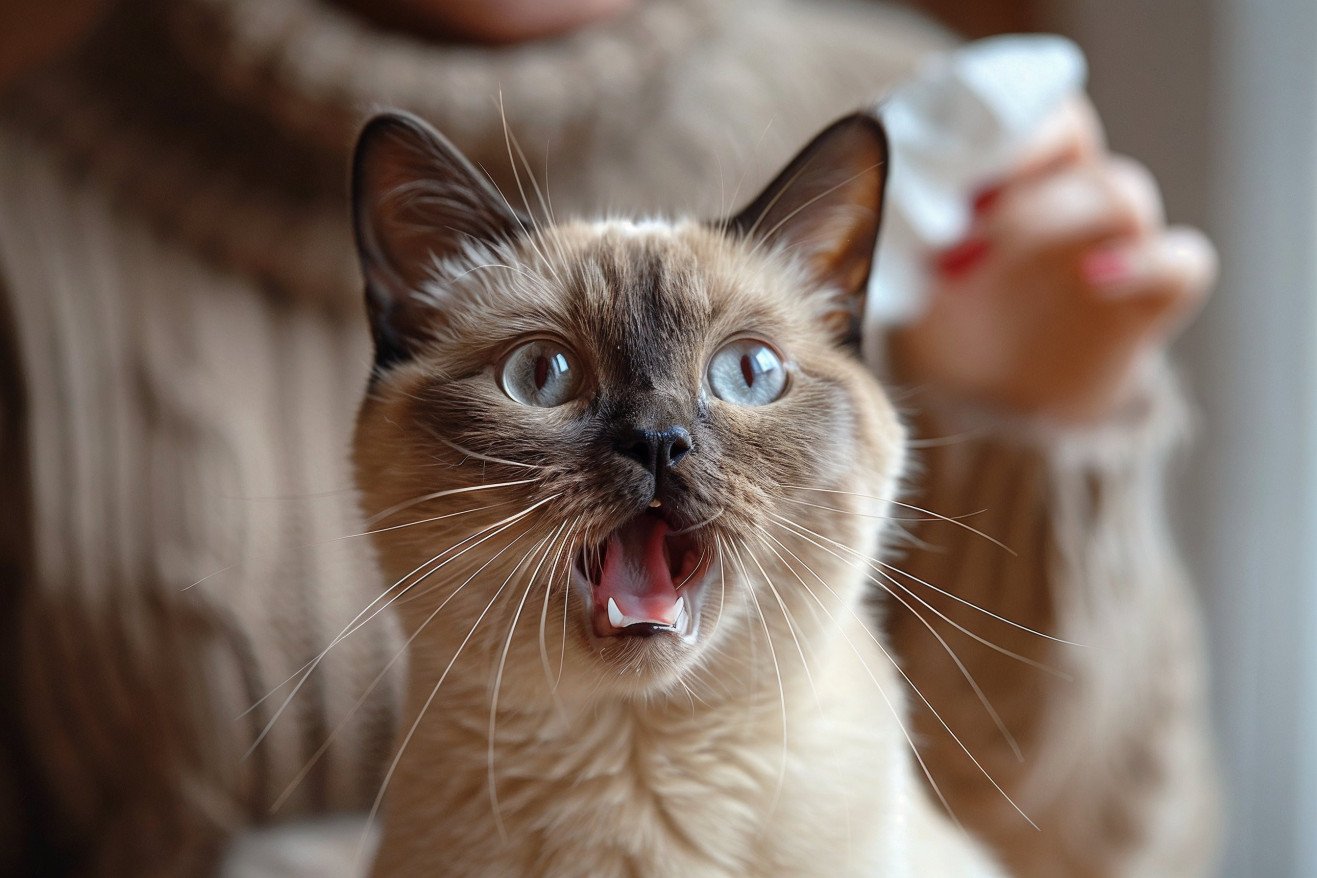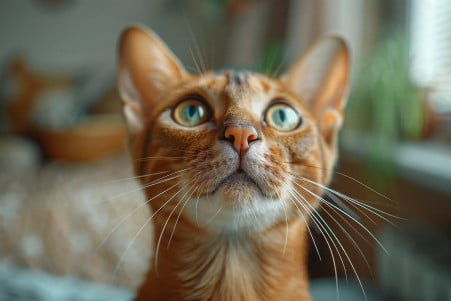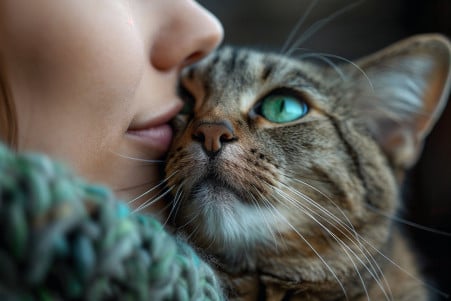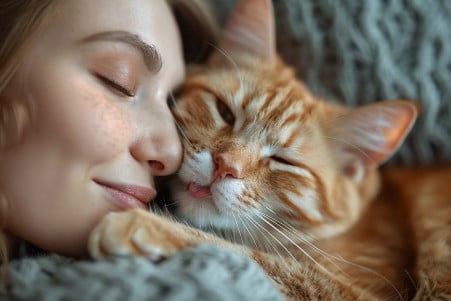Why Does My Cat Meow When I Sneeze? Exploring Feline Instincts
20 May 2024 • Updated 20 May 2024

Cats are highly sensitive to human sounds and behaviors, so it's not surprising that you've observed your cat meowing or reacting when you sneeze - but what does it mean? Your cat meows when you sneeze because the sudden, explosive noise is startling or distressing to them. Sneezing sounds like the loud, sudden alarm calls of prey animals, which activates your cat's instinct to check out potential threats in their environment.
In this article, we'll delve into animal behavior, evolutionary biology, and cat communication studies to find out what's really going on when your cat meows after you sneeze. This investigation will not only help you better understand your cat's hard-wired instincts but also give you a sense of how house cats interpret their environment based on the survival instincts of their wild ancestors.
Why does my cat meow when I sneeze?
Evolutionary Roots of Cats' Instincts
Although domestic cats are often thought of as lazy, spoiled pets, their wild ancestors were hunters who relied on their senses and instincts to stay alive. Studies on feline evolution and vocal communication suggest that loud, sudden noises like sneezes could have been a warning of danger from predators or prey in the wild. Cats' reactions to these noises, such as alertness or vocalizing, would have helped them detect danger and stay alive.
Even though cats have been domesticated for thousands of years, they still have many of the same instincts that helped their wild ancestors survive. As Live Science notes, even everyday human behaviors like sneezing can trigger an instinctive response in cats, whose meows are a leftover from the warning vocalizations they made in the wild. This evolutionary perspective helps explain why cats' behavior can seem strange to their human owners but is actually perfectly logical based on their ancestors' need to survive.
Cats' Acute Senses and Perception of Sneezes
Cats have excellent hearing that can detect frequencies far beyond the range of human hearing. As Catster notes, a human sneeze can be considered a very loud and startling noise to a cat. The air and sound that comes out with a sneeze can also stimulate a cat's whiskers, which can make the experience even more startling for them.
In some cases, cats may even think a sneeze is a hiss or another type of warning sound, which can lead them to investigate or even respond defensively, according to Why Does My Cat Meow When I Sneeze?. A cat's acute senses are responsible for their extreme reactions to sounds that humans don't even notice. While this sensitivity helps cats detect even the smallest changes in their surroundings, it can also lead to them responding in unexpected ways to common human behaviors like sneezing.
Meowing: Cats' Main Way of Communicating With People
Meowing is a form of vocal communication that cats reserve for their interactions with people. As noted in What Do the Different Cat Meows Mean?, kittens meow to get their mother's attention, and domestic cats carry on the behavior with their human parents. Meows are used for a variety of purposes, including greeting, asking for food or attention, indicating happiness or distress, and more.
If a cat meows when someone sneezes, it could be a sign that the cat is worried about the person, worried about the noise, or just surprised by the sudden sound, according to 5 Common Cat Noises and What They Mean. The different meanings of a cat's meows are discussed in more detail in 12 Cat Sounds Your Cat Makes and What They Mean, which explains that the subtleties of meowing can be used to determine a cat's mood and goals. As a result, listening to a cat's meows can help people interpret what their cats are trying to tell them.
Excessive Meowing and Health Issues
While a cat's meow in response to a sneeze is nothing to worry about, excessive or constant meowing in cats may be a sign of an underlying health problem. According to WebMD, conditions such as hyperthyroidism, kidney disease, and cognitive dysfunction in older cats can cause cats to meow more. The ASPCA also notes that cats that are in pain or discomfort may meow more often and with a different tone or pitch.
If a cat's meowing becomes excessive or disruptive or if there is a sudden change in the cat's meowing behavior, it's a good idea to have the cat checked out by a vet, according to the Lakeland Animal Clinic. This will help ensure that any health issues are identified and treated, which can help the cat feel better and reduce excessive meowing. Cat owners can also help keep their cats healthy by monitoring their meowing and seeking help if they notice any changes.
Strengthening the Human-Cat Relationship
The fact that cats meow at people more than other animals shows that the sound is a way for cats to communicate with their human companions, which is a sign of a strong bond, according to Do Cats Know When You're Sick?. By listening to the tone and context of their cat's meows, owners can better understand what their cat is trying to tell them. For example, as explained in 9 Cat Noises and What They Mean, a cat's meow can be used to say hello, ask for attention, or ask for food.
As a result, the way that owners respond to their cat's meows can help them build a stronger relationship with their pet. For example, as explained in Understanding Your Cat's Meow: Revealing its True Implications, the right response to a cat's meow can be a sign of comfort, a way to initiate play, or a way to address a concern. By responding to their cat's meows in the right way, owners can build a stronger bond with their pet.
By listening to their cat's meows and observing their other behaviors, owners can learn to understand their pet's needs and moods, which can help them build a stronger relationship with their pet. For example, as explained in Understanding Your Cat's Meow: Revealing its True Implications, by listening to their cat's meows and observing their other behaviors, owners can learn to understand their pet's needs and moods, which can help them build a stronger relationship with their pet.
Conclusion: Understanding and Appreciating Feline Behavior
A cat meowing in response to a human sneeze may seem like an odd behavior, but it stems from their evolutionary roots and acute senses. Understanding the reasons behind this quirk, such as a cat's survival instincts and heightened perception of sounds, can foster a deeper appreciation for their unique traits.
By paying attention to a cat's meows and other vocalizations, owners can gain valuable insight into their emotional states, needs, and health. By understanding and accepting these seemingly strange behaviors, cat owners can form a stronger bond with their pets. In the end, a cat's meows in response to a sneeze are just one of the many quirks that make these animals such interesting and beloved companions.


